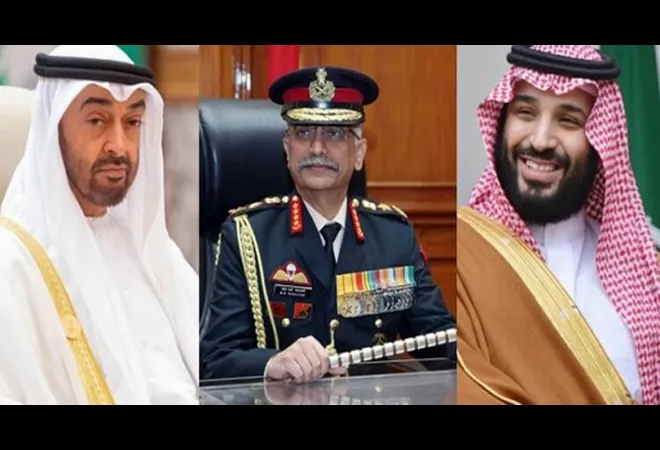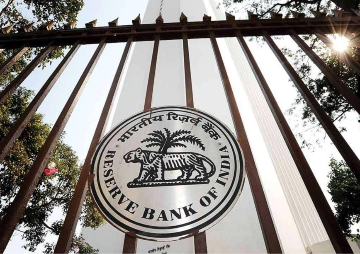
The chief of the Indian Army General MM Naravane is making a four-day trip to Saudi Arabia and the UAE, marking one more major trip from New Delhi to the Gulf region highlighting the increasing strategic cooperation between the two sides across the Arabian Sea. Gen. Naravane’s
schedule includes stopovers in Riyadh and Abu Dhabi and giving a talk at Saudi Arabia’s National Defence University. This visit comes on the heels of External Affairs Minister S Jaishankar’s trips to Bahrain and the UAE, and
upcoming trips by India’s top diplomats to Qatar, Kuwait and Oman.
The visit comes as a boost to the already aggressive diplomacy New Delhi has orchestrated in West Asia (Middle East), particularly with the Gulf, over the past few years. In October 2019, both India and Saudi Arabia had announced their first joint naval drills to take place in March 2020. In March 2018, India and the UAE conducted their
maiden naval exercise titled ‘Gulf Star 1’ as an expansion of the comprehensive strategic partnership between the two countries.
Gen. Naravane’s visit is significant as it is the first such visit by the chief of the Indian Army, opening a new avenue of defence cooperation, specifically when it comes to joint exercises and training in land warfare, particularly with regard to closer cooperation on issues such as counterterrorism. This could now become easier and more ingrained with the
signing of the Abraham Accords between the UAE, Bahrain and Israel and with the Saudis also acknowledging the deal,
albeit in a limited manner. Most of India’s defence outreach to the Gulf recently has been led by the Navy, with high level visits by the service peppered across 2017, 2018 and 2019. Earlier in 2015, a contingent of the Indian Air Force which included Sukhoi 30MKI fighters, C-17 and C-130J transport aircraft, IL-78 tankers and 110 personnel
conducted the first staging visit at Saudi’s King Fahd air base in Taif while on route to the United Kingdom. The same year, then IAF chief Arup Raha had
visited UAE and Oman and in 2016 the air forces of India and the UAE conducted
bilateral exercises. These institutions have since developed over the years at a steady pace.
Defence cooperation between India and the Gulf is an avenue that has had to be built almost from scratch. Historically, India has not exactly been absent from the region’s geo-political and defence environment. Between 1958 and 1989,
India trained Iraqi air force cadets in Tikrit both in operations and in tactical attack training (via deputation of Pilot Attack Instructors (PAI)) on the MiG aircraft variants, of which India still operates a significant numbers. While, of course, the India – Iraq bonhomie during the era of Saddam Hussein was much more aligned towards India’s narrow interest yet critical requirement of oil supplies, today the ideation of cooperation with the Gulf is that of an economic power in Asia and a growing strategic partner in global affairs, and not just a transactional state known to provide cheap labour and a market for oil.
Defence cooperation between India and the Gulf is an avenue that has had to be built almost from scratch. Historically, India has not exactly been absent from the region’s geo-political and defence environment
The defence cooperation, in fact, is a mesh of both the legacy issues between the sub-continent and the Gulf and new geopolitical and geoeconomics realities. Today, the depth of engagement is significant due to a variety of microcosms within the realities of a fast-changing global polity. India offers the Gulf states both access to defence technology, technical expertise and space to setup new tech ecosystems as countries such as Saudi plan their exit from being an oil reliant economy and diversify. However, more significantly, India is also in a good space to cash in from the likes of Saudi and UAE getting more comfortable in taking control of their own security and hedging an over-reliance on the US-provided security blanket. This is highlighted by examples such as the UAE opting to go for
Chinese drones for military use when the US refused to sell them the MQ-9 ‘Reaper’ drones, showcasing that Abu Dhabi was willing to source defence requirements from others if its security needs are not met from its traditional suppliers.
Reports around Gen. Naravane’s visit already have highlighted a
potential sale of the BrahMos missile system that has been jointly developed by India and Russia with both Abu Dhabi and Riyadh showing interest. Other systems such as the in-development
Advanced Towed Artillery Gun System (ATAGS) and other similar projects are seen as having considerable potential as export success stories, with the Gulf as a lucrative market. This opening in the Gulf for defence equipment can place Indian indigenous weapon systems not only for sale, but also offer joint-development schemes where the likes of Saudi and UAE can team up with Indian enterprise, both public and private sector, to develop weapons not only for consumption but export as well. This can be done on the same model as India, UAE and Saudi have been
working in the field of energy security.
Beyond the ambit of defence cooperation, New Delhi is also using its closeness to the Gulf block for multi-layered geopolitical reasons. India is using the fissures developed between Saudi Arabia and Pakistan to bolster its case as a long-term partner in heir apparent Mohammed bin Salman’s (MbS) bid to open up the Saudi economy and society, allowing India to promote its position on issues such as Kashmir more successfully within the Muslim world. India
hosted MbS in February 2019, where he received all the frills that a head of state does. This was a time when the Crown Prince was embroiled in the case of the
murder of journalist Jamal Khashoggi due to which most Western capitals were not keen on welcoming him. New Delhi took this challenge as an opportunity.
India is using the fissures developed between Saudi Arabia and Pakistan to bolster its case as a long-term partner in heir apparent Mohammed bin Salman’s (MbS) bid to open up the Saudi economy and society, allowing India to promote its position on issues such as Kashmir more successfully within the Muslim world
From a defence perspective, the Saudi – Pakistan partnership and even the Saudi – UAE partnership has been pivotal for decades. Pakistan has long been the net tactical security provider for the Saudis as far as manpower goes and is also seen as the offsite for Riyadh should it need nuclear capabilities in a short period of time. Former Pakistan Army chief General Raheel Sharif
took up the job of leading the Saudi-led multi-national alliance to fight terrorism. However, since then, the ties have taken a hit tracing back to former Pakistan Prime Minister Nawaz Sharif's decision to not send troops in Riyadh’s military operations in Yemen and current Prime Minister Imran Khan attempting to join the
breakaway Islamic grouping along with Turkey, Malaysia and Qatar. The results of these adventures have not helped Pakistan, with attempts by Pakistan Army chief General Qamar Bajwa and Director General of Inter-State Intelligence (ISI) Lt Gen Faiz Hameed being
unsuccessful in scoring an audience with MbS during their visit to Riyadh for damage control. Meanwhile, the UAE
released a list of 13 countries last month where it was suspending issuing of new visitor visas. This includes Pakistan. Earlier, the UAE had significantly curtailed giving worker visas to Pakistan nationals on back of security concerns and during this period workers from India were favoured.
The views expressed above belong to the author(s). ORF research and analyses now available on Telegram! Click here to access our curated content — blogs, longforms and interviews.



 The chief of the Indian Army General MM Naravane is making a four-day trip to Saudi Arabia and the UAE, marking one more major trip from New Delhi to the Gulf region highlighting the increasing strategic cooperation between the two sides across the Arabian Sea. Gen. Naravane’s
The chief of the Indian Army General MM Naravane is making a four-day trip to Saudi Arabia and the UAE, marking one more major trip from New Delhi to the Gulf region highlighting the increasing strategic cooperation between the two sides across the Arabian Sea. Gen. Naravane’s  PREV
PREV


